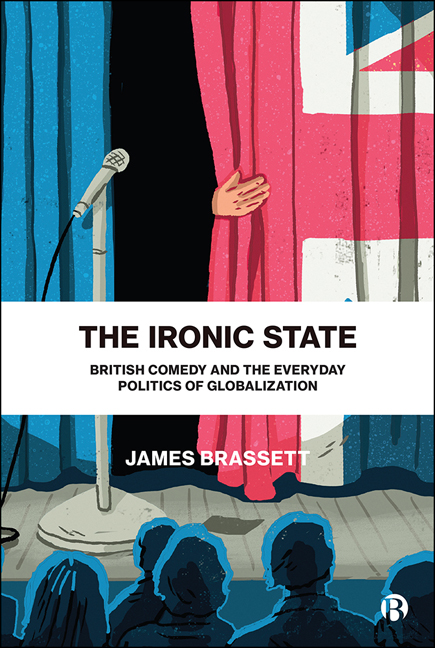Book contents
- Frontmatter
- Contents
- Acknowledgements
- Introduction: Comedy and the Politics of (Global) Resistance
- 1 Everyday Comic Resistance in Global Context
- 2 The Satire Boom: Imperial Decline and the Rise of the Everyday Elite
- 3 Alternative Comedy and Resistance to ‘Thatcher’s Britain’
- 4 Irony and the Liminality of Resistance
- 5 Austerity and the Rise of Radical Comedy
- 6 Brexit, or How I Learned to Stop Worrying and Love the Single Market
- 7 The Globalization of Comic Resistance?
- Bibliography
- Index
4 - Irony and the Liminality of Resistance
Published online by Cambridge University Press: 04 January 2022
- Frontmatter
- Contents
- Acknowledgements
- Introduction: Comedy and the Politics of (Global) Resistance
- 1 Everyday Comic Resistance in Global Context
- 2 The Satire Boom: Imperial Decline and the Rise of the Everyday Elite
- 3 Alternative Comedy and Resistance to ‘Thatcher’s Britain’
- 4 Irony and the Liminality of Resistance
- 5 Austerity and the Rise of Radical Comedy
- 6 Brexit, or How I Learned to Stop Worrying and Love the Single Market
- 7 The Globalization of Comic Resistance?
- Bibliography
- Index
Summary
Introduction: The anti-politics of irony?
British comedy has an acute potential to relay critical and reflexive arguments in the everyday public sphere of media entertainment. Previous chapters discerned an, at first, incidental, and subsequently, far more explicit association between comedy and radical politics over questions of imperial decline, class, the economy, commodification and so on. The contingent emergence of these central concerns within British comedy speaks of a sophisticated vernacular of everyday resistance that can both anticipate and negotiate the lived experiences of globalization. The potentialities of everyday comic resistance are sharpened by basic elements in the British satirical method; a sensitivity to (our own) pomposity, and a pervasive doubt about the grounds from which we joke, that is, self-deprecation. A democratization of this language through the rise of alternative comedy allowed for a rather more politicized and resistant inflection. Comedians actively contested the dumbing down of humour and thus the resistant qualities of the profession became a fundamental point of concern, one that recurs in in successive decades.
Leaving to one side the critical nuances of British comedy, this chapter will explore how the rise of ‘irony’ would fundamentally question the possibility of political comedy. Exponents of 1990s irony turned their attention to dilemmas of the ‘self ‘, very often a self that did not care about the ‘serious’ and ‘boring’ political issues that occupied alternative comedians. This emerged as part of a wider turn away from ideology associated with globalization and the (apparent) end of the Cold War. With the fall of the Berlin Wall and the so-called ‘end of history’, it was assumed that liberal cultural rights now formed an attractive normative consensus, so the question arose: why fight? Indeed, as Robert McCrum (2000) wrote in a sympathetic critique, it was far from obvious if irony was political at all:
The ironic tone that now envelops the British media – what Umberto Eco called self-expression in inverted commas – is part of a sustained assault on seriousness for the purpose of populist entertainment. There is nothing wrong with a culture of ridicule in the face of overweening power, but when irony becomes the first, and sometimes the only mode of discourse, it clogs up the arteries of grown-up discussion. Irony and ignorance have formed an unholy alliance. […] the British commentariat employs an ironic knowingness to disguise a real lack of knowledge.
- Type
- Chapter
- Information
- The Ironic StateBritish Comedy and the Everyday Politics of Globalization, pp. 77 - 96Publisher: Bristol University PressPrint publication year: 2021



